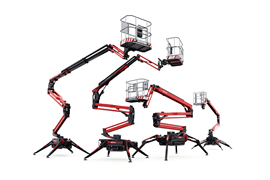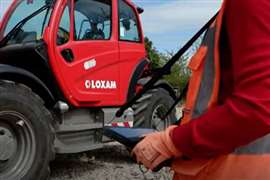Manitou's Bruno Fille on the priorities in integrating Gehl
16 February 2009

What will Manitou do with its newly acquired Gehl business? Murray Pollok asked Manitou's Bruno Fille to explain the strategy.
The first thing to say about the marriage of Manitou and Gehl is that it would seem to be good news for the US compact equipment manufacturer. In its pre-merger announcements, Manitou said it aimed to double Gehl's US$457 million business within three to five years, and Bruno Fille, executive vice president of Manitou, confirms to IRN that boosting Gehl's volumes will be a prime goal.
"The first objective will be to support the Gehl expansion on a worldwide basis...", says Mr Fille, "Manitou has a wider dealer network than Gehl with a presence in more than 110 countries. Such an opportunity should immediately benefit the development of skid steer sales volumes". Manitou and Gehl will investigate the possibility of offering Mustang and Gehl franchises to Manitou dealers if these franchises are available, he says.
The key Gehl products in this expansion will be its skid steer loaders, which Manitou will be able to sell to existing customers worldwide under the Gehl brand, although respecting existing Gehl dealerships. "We will not offer skid steer loaders in red [Manitou's colour]," Fille says.
Mr Fille says that Gehl's brands (Gehl and Mustang), its two manufacturing plants in South Dakota, US, and the three distinct dealership networks for Manitou, Gehl and Mustang will all be retained. "Gehl and Mustang will remain distinctive trademarks with different distribution agreements," he says. "Wherever we have common dealers, they will remain Manitou and Gehl dealers. They won't be placed under a single trademark. Where there are opportunities to reinforce Manitou or Gehl sales volume because of a lack of dealers in one of these trademarks, the existing dealers will be offered an additional franchise with a separate distribution agreement."
In North America, meanwhile, a second "key goal" is to increase sales of Manitou telehandlers into the US agriculture sector through Gehl's distribution network.
Manitou already owned a 15% share of Gehl, so the acquisition is a natural step for the company. "It's a good fit for Manitou for different reasons," Mr Fille says. "It's an opportunity to reinforce our presence in the US, in our core business. Gehl enjoys a good market share in telehandlers - about 10 percent in the US - and they have a nice distribution network in construction and agriculture, and a strong position in compact equipment."
North America represents 40% of the global rough terrain equipment market, according to Manitou, yet it represented just 2% of Manitou's $1.7 billion sales in 2007, so Gehl's North American presence will be important in diversifying Manitou's sales geographically.
The deal gives Manitou other options as well, one being the opportunity to build Manitou telehandlers at a Gehl facility, using US-sourced components. Mr Fille says that such a prospect has become more attractive given the euro-dollar currency movements, but says the first Gehl-produced Manitou handlers are unlikely to be seen until 2010.
If manufacturing of Manitou products at Gehl facilities is a possibility, what about building Gehl skid-steers in France? Fille says this is not a priority for the foreseeable future, although he reveals that Manitou is considering a plan to build in Europe the compact articulated wheeled loaders that are currently produced by Gehl in the US (and mainly for sale in Europe).
And what about Gehl's agreement with Germany's Wacker Neuson under which it sells some of the latter's mini and midi excavators in North America? Bruno Fille says it is his understanding that these excavators will continue to be available through Gehl. A similar Gehl alliance in Europe with Japan's IHI for mini excavators will also continue, he says.
Of course, Manitou is also a manufacturer of self-propelled aerial platforms. It has sold some to Canada in the past, but not so far in the US. Will the Gehl acquisition change that? It seems not, with Mr Fille saying it is not a priority.
That is understandable. Given the market slowdown and the need to integrate the newly acquired business, it is clear that Manitou already has quite enough on its plate.
=== PLANT SHUTDOWNS ===
Manitou is not alone among manufacturers in having to reduce its production capacity. During October and November the company was working a four day week and there was a two-week shutdown at all plants in December. Manitou says that some further plant shutdowns in January will also be necessary.
"For the construction sector, we will have to pass through a difficult year," says Bruno Fille. "There are absolutely no positive signals...in any part of the world." He says the decline in sales this year unlikely to exceed 25-35 percent, with Manitou somewhat insulated from construction in that around half of its sales are to the agricultural and industrial sectors (for Gehl, agriculture represents 30% of sales).
"We are convinced it will recover sooner in the US," says Mr Fille. "In Europe, the recession could last for two years."
STAY CONNECTED



Receive the information you need when you need it through our world-leading magazines, newsletters and daily briefings.
CONNECT WITH THE TEAM











